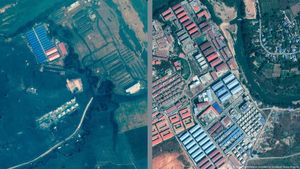Thailand's labor market outlook is facing both positive and negative challenges as it enters 2025. Despite recent surveys from Thammasat University showcasing impressive job placement rates for graduates, with numbers indicating as high as 92.62%, the broader economic conditions—both domestic and global—cast shadows over these figures.
According to various reports, the global economy entered the new year on shaky ground, with indications from the Purchasing Managers' Index (PMI) signaling significant slowdowns, particularly for the world's largest economy, the United States. January retail sales figures dropped by 0.9%, marking the steepest decline observed in two years. Such downturns reflect tighter household budgets as consumers grapple with inflation and higher interest rates, prompting some to rely on credit cards and accumulate debt.
While Thammasat University has reported continued success with its graduates maintaining near-perfect placement rates, the institution's achievements coincide with external pressures within Thailand's economy, which only grew by 3.2% year-over-year during the fourth quarter of 2024—a stark drop below expectations. The university credits its success primarily to specialized training programs and practical internship opportunities, allowing students to gain hands-on experience before graduation.
According to Professor Supasawad Chatchawan, the university's president, specific fields reported even higher employment rates, especially within the health sciences, where rates soared to 95.67%. This is encouraging news, particularly as demand for healthcare professionals continues to rise post-pandemic. Meanwhile, graduates from social sciences and humanities also presented strong figures, with employment rates over 90% consistently.
The high job placement rates can be partially attributed to Talented graduates benefiting from Thammasat's hands-on learning model, which provides real-world experiences through internships and partnerships with leading companies both domestically and internationally. These initiatives prepare students to meet the real demands of employers.
Despite the positive employment outcomes reported by the university, the larger economic picture indicates caution, with economists projecting slower growth for the Thai economy throughout 2025. The persistent challenges including high inflation and reduced consumer spending suggest potential gaps where graduates may not find employment suited to their skills.
This presents what could be described as skills mismatch; educational institutions may need to adapt more fluidly to the demands of the labor market, ensuring students graduate with the necessary competencies to fill current job vacancies. Both universities and employers highlight the importance of soft skills—things like analytical thinking, communication, and adaptability—as being just as important as hard skills obtained through academic training.
Dr. Supasawad emphasized this point, stating, "The high employment rate is not only about the rigorous academic standards we uphold at Thammasat but also reflects how well our graduates adapt to the fast-changing job market. Their soft skills often set them apart from candidates from other institutions."
Graduates are finding themselves well-equipped to excel, as demonstrated by the experience of Mook, a nursing graduate from Thammasat. She noted, "The comprehensive curriculum, alongside practical qualifications, has fortified my confidence as I entered the workforce. Our courses aligned closely with what employers are seeking, particularly within nursing and healthcare." These perspectives highlight the dual nature of the employment situation; even high placements can mask underlying issues of skills alignment.
Employers, too, face challenges. Many report difficulty finding candidates with the necessary skills, implying their stake in the dialogue about educational standards and employee expectations aligns with university assessments. Collaboration between educational institutions and industries is becoming more encouraged as both sectors strive to bridge any gaps between job openings and qualified talent.
The overall national employment data reflects mixed signals. While graduate outcomes are commendable, they don’t entirely portray the full labor market picture, which, as mentioned, is influenced by broader economic conditions. Forecasts for Thai economic growth estimate only 2.5% for the upcoming year, attributed to factors such as local inflation rates and pressures from tight monetary policy which could also prolong the skills gap.
Despite all the challenges, there remains cautious optimism. Thammasat University, according to its administrators, is committed to continuous curriculum improvement consistent with labor market demands, ensuring graduates not only succeed but thrive post-graduation.
"We aim to produce not only knowledgeable graduates but adaptable professionals ready to tackle today’s challenges," concluded Dr. Supasawad.



